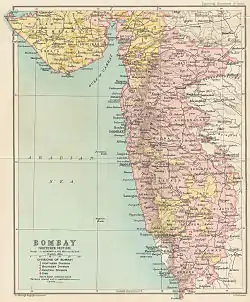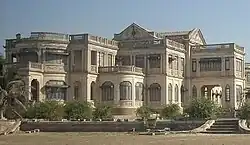Kingdom of Porbandar (1193–1307; 1785–1808) Kingdom of Ranpur (1307–1574) Kingdom of Chhaya (1574–1785) Porbandar State (1808–1948) | |||||||||
|---|---|---|---|---|---|---|---|---|---|
| 1193–1948 | |||||||||
 Flag
 Coat of arms
| |||||||||
 Porbandar in a map of the Bombay Presidency | |||||||||
| Status | Sovereign monarchy (1193-1808) Princely state of the British East India Company (1808-1858) and British India (1858-1948) | ||||||||
| Capital | Porbandar (1193-1307, 1785-1948) Ranpur (1307-1574) Chhaya (1547-1785) | ||||||||
| Common languages | Gujarati Old Gujarati Hindustani (Hindi) Sanskrit English | ||||||||
| Government | Sovereign Monarchy (1193-1808) Protectorateof the British East India Company (1808-1858) and Princely State British India (1858-1948) | ||||||||
| Maharaja Rana | |||||||||
• 10 December 1908-15 February 1948 | Natwarsinhji Bhavsinhji (last) | ||||||||
| History | |||||||||
• Established | 1193 | ||||||||
| 1948 | |||||||||
| |||||||||
| Today part of | Porbandar district and Junagadh district, Gujarat, India | ||||||||
.jpg.webp)

Porbandar State was a princely state during the British Raj ruled by Jethwa dynasty. It was one of the few princely states with a coastline.
The capital of state was the harbour town of Porbandar. Some other important towns of this state were Bhanvad, Chhaya, Ranpar, and Shrinagar. Earlier Shrinagar served as the capital of Jethwas, then Ghumli served as the capital, but was lost to the Jadejas, however, architectural heritage built by them still stands at Ghumli.
History
In 1888, during the reign of Vikramatji Khimojiraj, the State started metre-gauge railway called Porbandar State Railway, which after independence was merged in to Saurashtra Railway.[1]
Upon the Independence of India in 1947, the state acceded unto the dominion of India. It was merged with the 'United State of Kathiawar', effective from 15 February 1948 and eventually came to form part of the present-day state of Gujarat.
The grandfather of Mahatma Gandhi, the leader of Indian independence movement, Uttamchand Gandhi and later his father – Karamchand Gandhi and uncle – Tulsidas Gandhi, served as Dewan to Rana of Porbandar state.[2][3]
References
- ↑ "Porbandar railway".
- ↑ Encyclopaedia of Eminent Thinkers: The political thought of Mahatma Gandhi By K. S. Bharathi
- ↑ "Porbandar". www.britannica.com. Retrieved 10 December 2012.
External links
 Media related to Porbandar State at Wikimedia Commons
Media related to Porbandar State at Wikimedia Commons